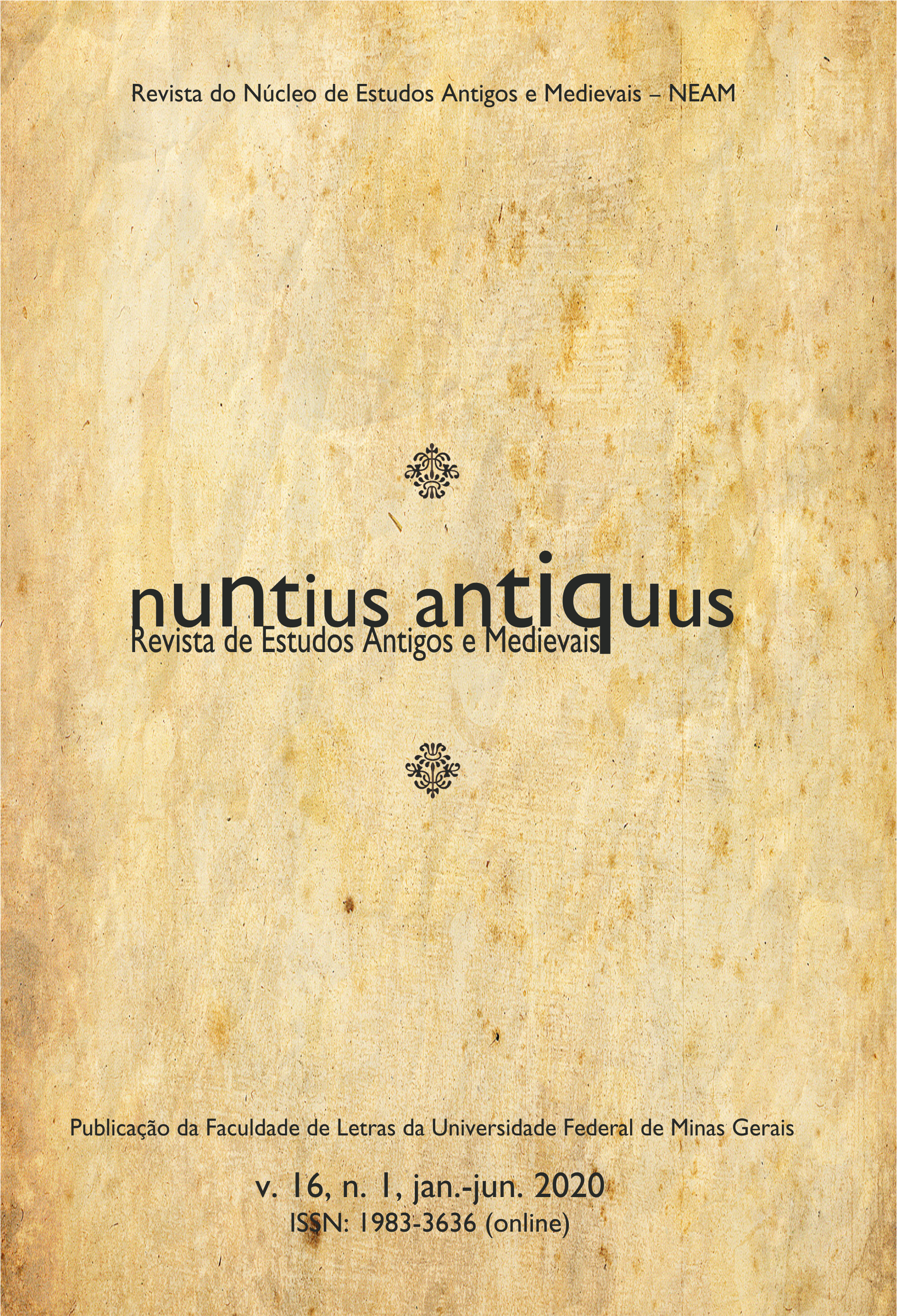Between Poets and Philologists
The Proposition of a Language Ideal in Apollonius Dyscolus’ Perì syntáxeos
DOI:
https://doi.org/10.35699/1983-3636..20985Keywords:
Greek syntax, literary examples, philology, language modelAbstract
Well known in the grammatical tradition as the formulator of the first treatise about the construction or syntax of the Greek language, Apollonius Dyscolus (2nd c. AD) devotes his Περὶ συντάχεως to a thorough examination of the Greek language, focusing mainly on its logical organization. However, the extensive reading of Apollonius’ work under this key has contributed to the overshadowing of the ‘philological’ dimension of this treatise perceived in the numerous analyses of constructions derived from poetic use, as well as in the quotations and allusions to poets and philologists within his work. Considering that the justification by Apollonius in his prologue was the “understanding of the writers and poets”, we ask ourselves: what role do poets and prose writers play in this study? We intend to show that Apollonius, despite never abandoning entirely the logic framework of his syntactic theory, puts in evidence a close reading of the Alexandrian philological tradition, both in the examples, quotations and allusions of poets and philologists, and in the procedure of analysis of Homer passages.
Downloads
References
APOLLONIUS DYSCOLUS. Appolonii Dyscoli quae supersunt. In: SCHNEIDER, R.; UHLIG, G. (org.). Grammatici Graeci, 1-3. Leipzig: Teubner, 1878-1910 [Republished: Hildesheim: Olms, 1965].
APOLLONIUS DYSCOLUS. De la construction. Edição e tradução de J. Lallot. Paris: Vrin, 1997. 2 v.
APOLLONIUS DYSCOLUS. Sintaxis. Introdução, tradução de notas de Vicente Bécares Botas. Madri: Gredos, 1987.
APOLLONIUS DYSCOLUS. The Syntax of Apollonius Dyscolus. Translated and with commentary by Fred W. Householder. Amsterdam: Benjamins, 1981. (Amsterdam Studies in the Theory and History of Linguistic Science, III: Studies in the History of Linguistics, 23).
BARATIN, M. La littérarité comme performance de textes techniques: les Artes grammaticae antiques. In: CONGRESSO NACIONAL DE ESTUDOS CLÁSSICOS, XVIII., 2011, Rio de Janeiro. Rio de Janeiro: SBEC, 2011. (Conferência de encerramento).
BECARES BOTAS, V. Introducción. In: APOLÔNIO DÍSCOLO. Sintaxis. Introdução, tradução de notas de Vicente Bécares Botas. Madri: Gredos, 1987. p. 9-70.
BLANK, D. Ancient Philosophy and Grammar. Chico – California: Scholars Press, 1982.
BLANK, D. Apollonius Dyscolus and Herodian. In: BROWN, K. (ed.). Encyclopedia of Language and Linguistics. 2. ed. Rio de Janeiro: Elsevier, 2006. p. 327-329. DOI: https://doi.org/10.1016/B0-08-044854-2/01338-9.
BLANK, D. The organization of grammar in ancient Greece. In: AUROUX, S. (org.). History of the Language Sciences/Geschichte der Sprachwissenschaften/Histoire des sciences du langage. Berlim/Nova York: Walter de Gruyter, 2000. v. 1, p. 400-416.
BOWIE, E. L. Greek Literature after 50 B.C. In: DOVER, K. et al. Ancient Greek Literature. 2. ed. Oxford: Oxford University Press, 2004.
COLOMBAT, B. La construction, la manipulation de l’exemple et ses effets sur la description dans la tradition grammaticale latine. Langages, [S.l.] n. 166, p. 71-85, 2007. DOI: https://doi.org/10.3917/lang.166.0071.
DALIMIER, C. Apollonius Discole, Traité des Conjonctions. Introduction, texte, traduction et commentaire. Paris: Librairie Philosophique J. Vrin, 2001.
DESBORDES, F. Idées grecques et romaines sur le langage : travaux d’histoire et d’épistémologie. Lyon: ENS Editions, 2007.
FORTES, F. Non solum fama: os exempla de Prisciano na construção de um cânon literário. In: LEITE, L. R. et al. (org.). Fama e infâmia no mundo antigo. Vitória: PPGL, 2014. p. 76-82.
FORTES, F. Sintaxe greco-romana: Apolônio Díscolo e Prisciano de Cesareia na história do pensamento gramatical antigo. 2012. 406f. Tese (Doutorado em Linguística) – IEL/UNICAMP, Campinas, 2012.
FREDE, M. Essays in Ancient Philosophy. Minneapolis: University of Minnesota Press, 1987. p. 301-359.
HARVEY, Paul. Dicionário Oxford de Literatura Clássica. Tradução de Mário da Gama Kury. Rio de Janeiro: Jorge Zahar, 1987.
HOUSEHOLDER, F. W. Apollonius Dyscolus and Herodian. In: KOERNER, E. F. K.; ASHER, R. E. (ed.). Concise History of the Language Science: from the Sumerians to the Cognitivists. Cambridge: Cambridge University Press, 1995. p. 111-115. DOI: https://doi.org/10.1016/B978-0-08-042580-1.50022-2.
ILDEFONSE, F. La naissance de la grammaire dans l’Antiquité grecque. Paris: Vrin, 1997.
LALLOT, J. Dis-moi comment tu traites les exemples, je te dirai quel grammarien tu es: application à Apollonius Dyscole. Langages, [S.l.], n. 166, p. 57-70, 2007/2. DOI: https://doi.org/10.3917/lang.166.0058.
LALLOT, J. Entre Apollonius et Planude: Priscien passeur. In: BARATIN, M. et al. (org.). Priscien: transmission et refondation de la grammaire. De l’Antiquité aux modernes. Turnhout: Brepols, 2009. 153-166. DOI: https://doi.org/10.1484/M.SA-EB.3.1209.
LALLOT, J. Notes et index. In: APOLÔNIO DÍSCOLO. De la construction. Edição e tradução de J. Lallot. Paris: Vrin, 1997. v. 2
LAMBERT, F. La linguistique grecque chez les alexandrins: Aristophane de Byzance et Aristarque. In: AUROUX, S. (org.). History of the language Sciences/Geschichte der Sprachwissenschaften/Histoire des sciences du langage. Berlim/Nova York: Walter de Gruyter, 2000. v. 1, p. 385-393.
LESKY, A. História da Literatura Grega. Tradução de Manuel Losa. Lisboa: Fundação Calouste Gulbenkian, 1995.
LUHTALA, A. On the Origin of Syntactical Description in Stoic Logic. Münster: Nodus Publikationen, 2000.
MARTINHO, M. Dionísio da Trácia, Arte. Letras Clássicas, São Paulo, n. 11, p. 153-179, 2007. DOI: https://doi.org/10.11606/issn.2358-3150.v0i11p153-179.
MÜLLER, M. Vorlesungen über die Wissenschaft der Sprache. Leipzig: Verlag Von Gustav Mayer, 1875. v. 1
PEREIRA, M. H. R. Estudos de história da cultura clássica. 11. ed. Edição revista e ampliada. Lisboa: Fundação Calouste Gulbenkian, 2012. v. I: Cultura grega.
PFEIFFER, R. History of Classical Scholarship from the Beginnings to the End of Hellenistic Age. Oxford: Clarendon, 1968.
REYNOLDS, L. D.; WILSON, N. G. Scribes and Scholars: A Guide to the Transmission of Greek and Latin Literature. 3. ed. Oxford: Clarendon Press, 1991.
SCHMIDHAUSER, A. Le De pronomine de Priscien et son modèle grec. In: BARATIN, M. et al. (org.). Priscien: transmission et refondation de la grammaire. De l’Antiquité aux modernes. Turnhout: Brepols, 2009. 167-181. DOI: https://doi.org/10.1484/M.SA-EB.3.1210.
SLUITER, I. Ancient grammar in context. Contributions to the study of Ancient Linguistic Theory. Amsterdam: VU Press, 1990.
UHLIG, G. Die τέχναι γραμματικαί des Apollonios und Herodian. Rheinisches Museum für Philologie, Köln, v. 25, n. 1, p. 66-75, 1870.
WEST, M. L. Crítica textual e técnica editorial. Lisboa: Calouste Gulbenkian, 2002.
Downloads
Published
Issue
Section
License
Copyright (c) 2020 Fabio Fortes

This work is licensed under a Creative Commons Attribution 4.0 International License.










